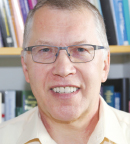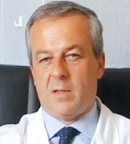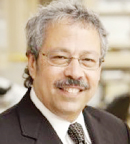With advances in the field, the number of haploidentical stem cell transplants being performed (ie, using human leukocyte antigen [HLA] half-matched donor stem cells) has been increasing. In recognition of evolving strategies to improve outcomes, a group of transplant physicians started the Haploidentical Transplant Symposium (HAPLO) in 2012. Physicians and researchers continue to meet annually for the HAPLO symposium, 2 days before the start of the American Society of Hematology (ASH) Annual Meeting & Exposition, to discuss the latest and most important advances in the field.

There has been a dramatic increase in the number of haploidentical donor transplantations worldwide for at least two reasons: significantly improved outcomes … and the easy accessibility of HLA half-matched related donors.— Stefan Ciurea, MD
Tweet this quote
“There has been a dramatic increase in the number of haploidentical donor transplantations worldwide for at least two reasons: significantly improved outcomes, now comparable with HLA-matched transplants, and the easy accessibility of HLA half-matched related donors that can now be used for transplantation,” explained Stefan Ciurea, MD, Program Chair for HAPLO2018, which was held this past November in San Diego. Dr. Ciurea is Associate Professor of Stem Cell Transplantation and Cellular Therapy at The University of Texas MD Anderson Cancer Center in Houston.
“In 2016, approximately 1,500 haploidentical transplants were done in the United States, and more than 2,000 were performed in Europe. As centers become more familiar with this type of transplant, there is increasing interest in using this approach,” he noted.
“In tandem with the increased interest in haploidentical transplants, we are very interested in utilizing novel nontransplant cellular therapy to improve outcomes further. This will allow us to decrease the intensity of conditioning chemotherapy for transplantation and decrease toxicity, as well as increasingly rely on the immunologic effects of the graft to cure patients with hematologic malignancies. So the field is moving away from intensified conditioning to the application of cellular therapy as a form of immunotherapy to improve transplant outcomes,” Dr. Ciurea explained.
Multiple examples of novel cellular therapies—some already approved by the U.S. Food and Drug Administration for the treatment of hematologic malignancies—can potentially be used in combination with hematopoietic stem cell transplantation, including modified T cells such as chimeric antigen receptor (CAR) T cells, modified T cells with a safety switch, expanded natural killer (NK) cells, CAR-expressing NK therapy, and gamma-delta T cells.
“We are trying to improve outcomes using cellular therapy before and after allogeneic transplant. For example, at MD Anderson, we are using ex vivo expanded NK cells to try to achieve remission in patients with advanced refractory acute myeloid leukemia [AML] and take them to transplant. Also, we are giving ex vivo expanded NK cells early after transplant to prevent relapse in patients with high-risk myeloid malignancies,” Dr. Ciurea continued.1
HAPLO2018 Details
The 1-day annual HAPLO meeting is designed to provide updates on recent developments in haploidentical transplantation and other cellular therapies, with the goal of integrating nontransplant cellular therapies into the transplant process to improve the likelihood of cure. The number of participants has increased from approximately 100 in 2012 to 200 in 2018. The full-day meeting comprises 16 to 18 15-minute talks given in 3 sections.

Carl H. June, MD

Ulrike Koehl, MD
Sessions of particular interest at HAPLO2018 included a keynote address by Carl H. June, MD, a pioneer in the development of CAR T-cell therapy. Dr. June spoke about recent research on future strategies to manipulate CAR T cells, including different targets, multiple targets in one CAR T-cell product, B-cell maturation antigen–specific CAR T cells in multiple myeloma, and other approaches.
“In addition to the work by many groups in the United States, there is tremendous interest in CAR T-cell therapy in China, as reported at HAPLO2018 by He Huang, MD, PhD, of Zhejiang University, Hangzhou, China, and many groups are interested in NK-cell therapy and modified NK cells with a CAR, as discussed by Ulrike Koehl, MD, of Hannover Medical School in Germany,” Dr. Ciurea noted.
CD117 Antibody-Drug Conjugates
In an interview with The ASCO Post, Syed Ali Abutalib, MD, a regular meeting attendee, described several HAPLO2018 presentations of research on novel cellular strategies. Dr. Abutalib is Associate Director of the Hematology and Bone Marrow Transplantation Program and Director of the Clinical Apheresis Program at Cancer Treatment Centers of America in Chicago; Associate Professor at Roseland Franklin University of Medicine and Science; as well as Founder and Co-Editor of Advances in Cell and Gene Therapy.

This ongoing exceptional work [with antibody-drug conjugates] sets the stage for different ways transplant could be performed, and it opens the door to safer, more efficient, yet gentler and relatively nontoxic conditioning therapy.— Syed Ali Abutalib, MD
Tweet this quote
“Engraftment of allogeneic hematopoietic CD34-positive cells has traditionally required an intensified conditioning regimen, which is the primary cause of morbidities and mortality in transplant recipients,” Dr. Abutalib explained. “This often limits the broader application of transplantation. Currently employed myeloablative conditioning regimens are nonspecific; they include total-body irradiation and high-dose chemotherapy, which lead to acute and chronic toxicities and cytokine storms and may facilitate the development of graft-vs-host disease, as well as organ toxicities, secondary malignancies, and infertility. It would be most desirable to have a conditioning regimen with less toxicity that is more specific and does the job without creating unnecessary adverse effects.”
One such approach to more specific, less toxic conditioning regimens is to use an antibody-drug conjugate targeted to CD117 (also known as c-kit), which was discussed at HAPLO2018 by Agnieszka Czechowicz, PhD, of Stanford University, Palo Alto, California.
“Conjugated antibodies can bind to receptors such as CD117 and create an environment for the marrow niche to facilitate engraftment. CD117 is expressed by physiologic hematopoietic stem and progenitor cells and on the majority of hematopoietic stem cells of myelodysplastic syndromes [MDS] and AML blasts,” Dr. Abutalib noted.
Dr. Czechowicz described experimental models of MDS and AML showing that specific antibody-drug conjugates effectively deplete marrow and “unwanted” cells, creating vacancies that facilitate donor stem cell engraftment.

Agnieszka Czechowicz, PhD
“This novel targeted application of a conditioning regimen using specific antibody-drug conjugates, if it is proven successful in humans, has the potential to expand the utility of hematopoietic cell transplantation. This ongoing exceptional work sets the stage for different ways transplant could be performed, and it opens the door to safer, more efficient, yet gentler and relatively nontoxic conditioning therapy,” Dr. Abutalib commented.
“With intensified conditioning, we destroy more ‘innocent bystander’ cells and tissue. This approach is not only exciting for the transplant therapy arena, but also for the gene therapy platform,” he continued.
Multiple CD117 monoclonal antibody conjugates are currently in development and being tested. “If this is successful in humans, it will be a game-changer,” he stated.
CAR-NK Therapy
Dr. Koehl discussed the use of CAR-expressing NK cells for cancer retargeting and suggested the potential for an “off-the-shelf” cellular therapy in this setting.
“The tumor is smart and gets around routine NK-cell surveillance. One of the methods to overcome this is the development of special CAR-NK cells, as discussed by Dr. Koehl,” Dr. Abutalib said.
Dr. Koehl described preliminary studies and 11 clinical trials of CAR-NK cells that are ongoing. Apparently, CAR-NK cell therapy has a more favorable toxicity profile than CAR T cells but has a limited in vivo life span.
“Dr. Koehl’s work is about how NK cells can be augmented by CAR for clinical use to cure hematologic cancers and solid tumors. The idea is to genetically transduce CAR on NK cells with selective interleukin (IL) to keep the cell running as a ‘tumor-killing machine’ and also to transduce an inducible suicide gene as a safety switch if CAR-NK cells ‘misbehave’ inside the human body,” he explained.
“There is a lot we don’t know about these genetically engineered CAR-NK cells, including the best way to procure them—that is, whether from the peripheral blood, marrow, cord blood, human-induced pluripotent stem cells, or NK-92 cell lines. NK cells rely on a variety of different receptors to kill tumor cells and may be less likely to falter than CAR T cells,” Dr. Abutalib continued.
“We are at the infancy of this strategy. There are pros and cons of generating CAR-NK cells, and it is unclear whether they will ultimately be more effective compared with ex vivo expanded NK cells or CAR T cells,” Dr. Abutalib noted.
Impediments to the clinical use of CAR-NK include the possibility of the infusion contaminating T or B cells, depending on the source of NK cells. The short life span of NK cells requires that they be continuously activated by cytokines to enhance their cytotoxic activity. Experimental approaches to augmenting the proliferative and cytotoxic activity of CAR-NK cells as well as controlling their adverse effects include stimulation with the IL2 and/ or IL15 gene and incorporating a suicide gene, respectively.
Adenosine to Eliminate Graft-vs-Host Disease
Ex vivo application of adenosine is cytotoxic to selective T cells and represents an inexpensive and reproducible approach to the depletion of alloreactive T cells and reduced risk of graft-vs-host disease. At HAPLO2018, John Barrett, MD, PhD, of George Washington University, Washington, DC, discussed data using adenosine to selectively deplete the graft-vs-host disease–causing alloreactive T cells (ie, “bad actors,” such as the alpha-beta T cells).2
“One of the most feared complications of allogeneic transplant is graft-vs-host disease, which is the primary cause of posttransplant morbidities and mortality. An important avenue of research is how to prevent graft-vs-host disease without compromising the graft-vs-tumor effect and establishing immune system recovery,” Dr. Abutalib explained. “Different groups are evaluating various approaches to try to deplete alloreactive T cells from the overall T-cell population in the graft, and the use of adenosine is one such approach. Other experimental approaches include photodepletion and depletion of alpha/beta–positive T-cell receptors and CD19-positive T cells. We want to take out the ‘bad guys’ and leave in the ‘good guys’ in the graft to provide rapid immune reconstitution and maintain the graft-vs-tumor effect.”
Pediatric Advances
Cellular therapies such as CAR-NK and expanded NK cells can be used in children as well as adults, according to Rupert Handgretinger, MD, a pediatric hematologist at the University of Tuebingen in Germany, who was co-organizer of HAPLO2018 and commented on pediatric advances discussed at the symposium.

Rupert Handgretinger, MD
“At our center, in pediatric patients undergoing haploidentical transplant, we take HLA–half-matched patients’ peripheral blood stem cells mobilized with growth factor support and then perform T-cell depletion ex vivo, depleting the alpha-beta T cells that cause graft-vs-host disease. This eliminates the risk of high-grade graft-vs-host disease,” Dr. Handgretinger explained. “But a disadvantage of this approach is that it might lead to delayed immune recovery, which makes the patient vulnerable to bacterial, viral, and fungal infections.”
Franco Locatelli, MD, of IRCCS Ospedale Pediatrico Bambino Gesu, Rome, updated attendees on a registration trial of rivogenlecleucel (formerly known as BPX-501). Rivogenlecleucel is an adjunctive T-cell therapy with genetically modified donor T cells that incorporate an inducible caspase 9 safety switch, providing a safety net should graft-vs-host disease occur. There are currently two registration trials of the drug underway—one in the United States and one in Europe.

Franco Locatelli, MD
Dr. Locatelli presented clinically impressive data on children who received an alpha-beta T-cell–depleted haploidentical graft followed by add-back of T cells to accelerate immune reconstitution (which, at the same time, might cause graft-vs-host disease). These add-back T cells were modified prior to infusion to express inducible caspase 9.
“If a patient develops graft-vs-host disease caused by the modified T-cell add-back, the condition can be treated by a drug called rimiducid, according to data presented by Dr. Locatelli. Rimiducid is a small molecule that activates caspase 9 and induces apoptosis of the T cells, which have been modified to express caspase 9. That process leads to elimination of the T cells that caused the graft-vs-host disease and reversal of the condition,” Dr. Handgretinger explained.
MORE ON CD117 ANTIBODIES
For more data on CD117 monoclonal antibodies, see abstracts 3324 and 3516 from the 2018 ASH Annual Meeting & Exposition.
In a study presented at the 2018 ASH Annual Meeting & Exposition, 249 pediatric patients (41% with hematologic malignancies) received rivogenlecleucel.3 Among patients who developed steroid-refractory graft-vs-host disease, the response rate to rimiducid was 86% (12 complete responses and 6 partial responses). Responses occurred within a median of 2 days.
“You don’t know which patient will develop graft-vs-host disease in advance using this T-cell add-back strategy, but once it develops, you can use rimiducid to rapidly stop graft-vs-host disease and eliminate it. This strategy is being studied in pediatric [acute lymphocytic leukemia] and AML,” Dr. Handgretinger said.
[The use of rimiducid to treat graft-vs-host disease] is a big step forward and makes transplantation safer.— Rupert Handgretinger, MD
Tweet this quote
“This is a very promising discovery that will influence the field of haploidentical transplant,” he commented. “It is a big step forward and makes transplant safer. We are eager to have more experience with this drug. This approach is not limited to haploidentical transplant; it might also be useful in matched-related and matched-unrelated transplant patients, where graft-vs-host disease still presents a major problem despite the full HLA match,” Dr. Handgretinger said.
Additional Research on NK Cells
Among the NK-cell–based therapies currently being studied in both adults and children with solid tumors, an off-the-shelf product of NK-92 cell lines (NantKwest) is particularly promising, Dr. Handgretinger noted. “We are also studying autologous and allogeneic NK-cell–based approaches and an off-the-shelf NK-92 cell line in Germany, but it is still early work, and there is not yet a clinical protocol,” he continued.

Mitchell Cairo, MD
Also at HAPLO2018, Mitchell Cairo, MD, Professor of Pediatrics, Division of Pediatric Hematology, Oncology, and Stem Cell Transplant, New York Medical College, Valhalla, New York, discussed research on adoptive NK-cell therapy in pediatric solid tumors. The therapy he described utilizes NK cells from the patient for autologous transplantation; these cells are expanded ex vivo and reinfused to the patient. Clinical trials are ongoing, and the results of these studies will likely be available in the near future. ■
DISCLOSURE: Dr. Ciurea has received research funds from Miltenyi Biotech; is an advisor for Kiadis Pharma, Cytosen Therapeutics, and MolMed SpA, and is cofounder and has ownership in Cytosen. Dr. Abutalib is an advisor for AstraZeneca and Takeda. Dr. Handgretinger is a co–patent holder of the TcR alpha/beta depletion system and has received research support from Miltenyi Biotech.
MORE ON NK CELLS
For more data on NK cells, see abstracts 730, 3491, 4541, and 4547 from the 2018 ASH -Annual Meeting
& Exposition.
REFERENCES
1. Ciurea SO, Schafer JR, Bassett R, et al: Phase 1 clinical trial using mb-IL21 ex vivo-expanded donor-derived NK cells after haploidentical transplantation. Blood 130:1857-1868, 2017.
2. Whitehill GD, Amarnath S, Muranski P, et al: Adenosine selectively depletes alloreactive T cells to prevent GVHD while conserving immunity to viruses and leukemia. Mol Ther 24:1655-1664, 2016.
3. Elkefy R, Jacobsohn DA, Agarwal R, et al: Administration of rimiducid following haploidentical BPX-501 cells in children with malignant or non-malignant disorders who develop graft-versus-host-disease. 2018 ASH Annual Meeting & Exposition. Abstract 2207. Presented December 1, 2018.

